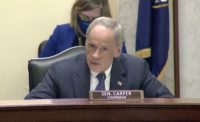But Baucus said, “We’ll come up with another idea, and we will make sure we get that enacted. I’ve got lots of ideas.”
Boxer said, “Senator, that’s music to all of our ears.”
Many other hurdles lie ahead before a multi-year surface transportation bill can become law. Nearly all the EPW committee members mentioned or outlined amendments that they may offer when the measure gets to the Senate floor.
When the highway bill does hit the floor, it must be combined with titles to be written by other committees, to authorize mass transit and highway safety programs and, most importantly, revenue sources.
UPDATE: Members of the Senate banking committee, which has jurisdiction over public transit, have been notified that their panel could have a markup of the transit portion of the surface transportation package during the first week after the Thanksgiving recess, a Senate aide says.
If the full Senate approves that package, it then would have to be reconciled with a House measure, which has not yet been introduced.
House Transportation and Infrastructure Committee Chairman John Mica (R-Fla.) has been drafting a six-year highway-transit measure. He said recently that Speaker John Boehner (R-Ohio) has supported funding that matches current levels. Mica said that would be about $285 billion over six years, for highways, transit and safety combined.
Boehner has said he wants to link a transportation measure with provisions to expand domestic oil and gas exploration.
UPDATE: Following Boehner's lead, other House Republicans announced on Nov. 11 that they plan to introduce two measures to address the energy part of Boehner's package.


